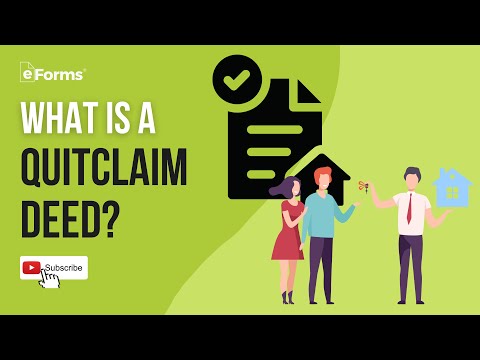Don’t let the jargon-heavy title alarm you. When it comes to mortgage matters, understanding what’s what could save you time, headaches, and, yes, even money. What is a quit claim deed? You’re about to find out. This comprehensive analysis will arm you with insights on its definition, origin, significance in different contexts such as marriage, and more. Let’s dive in.
Understanding “What Is a Quit Claim Deed?” – A Comprehensive Analysis
The Quit Claim Deed: A Simple Definition to Start With
At its most basic level, a quit claim deed refers to a legal document where a person, known as the grantor, essentially says to another person, called the grantee: “I’m quitting any claim I may have to this property, so it’s all yours now”. This type of transfer makes no seller guarantees. It merely states that the seller transfers any ownership interest to the buyer.
This looks simple on the surface. However, the devil is in the details. Yes, the grantor transfers any ownership interest, but the key word here is any. If the seller, for instance, has absolutely no ownership interest in the property, that’s precisely what transfers in a quit claim deed to the buyer.
Unlike its cousin the warranty deed, the quit claim deed provides no warranty (accident man) that the grantor has a valid ownership stake in the property or that the title is free from liens or other encumbrances. A warranty deed, contrastingly, comes with a guarantee that the grantor has a clear and free title to the property.

In-Depth Understanding of the Quitclaim Deed Meaning
The concept of the quit claim deed finds its origins to the common law tradition, a system of law that originated in England and later adopted by the United States.
At its core, a quit claim deed consists of legally binding elements such as the grantor’s information, grantee’s information, description of the property, and the signature of the grantor, often notarized for verification.
Quit claim deeds shine in situations where the property is transferred between family members (divorce proceeding or inheritance), shifting property into a living trust, or removing clouds in the title.
Quick Deed vs Quit Claim Deed: Exploring the Differences

Quick Deed Demystified
If you’ve heard about ‘quick deeds’, let me dash your hopes now. There’s no such thing. Perhaps you’re thinking of a quit claim deed or a grant deed, even. The term ‘quick deed’ is often a misnomer for quit claim deed. The confusion arises from the speed at which a quit claim deed allows parties to transfer property rights.
For the sake of clarity, do peruse Mortgage Rater’s repository on What a grant deed Entails to dispel any remaining myth.
Quit Claim Deed NC: State-Specific Considerations and Implications
It’s vital to understand the nuances of state laws when dealing with quit claim deeds. Not every state views or handles them the same way. Consider North Carolina, for instance.
Under North Carolina laws, quit claim deeds are generally regarded with a smidge of suspicion. The real estate transaction process emphasizes clearly defined property lines and confirmed proprietorship, items that quit claim deeds don’t necessarily provide. For a more real-world understanding, visit this link to get a grasp on the specifics of a quit claim deed in California.

| Subject | Information |
|---|---|
| Definition of Quitclaim Deed | A type of property transfer where the seller provides no guarantees regarding the ownership. |
| How Quitclaim Deed Works | The seller transfers his/her ownership interest, if any, to the buyer. |
| Acceptance of Quitclaim Deed in Texas | Generally not accepted due to lack of warranty and does not transfer title. |
| Statute of Limitations for Prior Deeds in Texas | A four-year statute of limitations applies for a prior deed to come into effect. |
| Use of Quitclaim Deed in Illinois | Often used to transfer property between close family members or trusted friends. |
| Preparation of Quitclaim Deed in Illinois | Relatively easy to prepare; many opt for online service providers for assistance. |
| Risk with Quitclaim Deed | If the seller has no ownership interest in the property, no ownership transfers to the buyer. |
The Weighty Repercussions of A Quit Claim Deed: What You Should Know
Financial Legislation and Impacts
Understanding the financial implications of a quit claim deed means dealing with ever-dreaded tax obligations, costs, fees, and mortgage considerations, not to mention possibly navigating Loans For bad credit in Texas.
A quit claim deed doesn’t exempt you from paying or shouldering costs such as the real estate transfer tax, recording fee, and attorney fees. On the mortgage side, if your name isn’t removed from a mortgage and the other person defaults, heaven forbid, you could find yourself in money trouble.
Potential Legal Disputes
Engaging with quit claim deeds isn’t all rosy. There are legal risks involved, including potential accusations of fraud, challenges on current and future property rights, and dispute resolution mechanisms.
It’s not unheard of for unscrupulous folks to defraud others by getting them to sign quit claim deeds without fully understanding the implications. This leaves the grantee high and dry, owning nothing more than a worthless piece of paper. Knowledge is power and can protect you against these pitfalls.

Complex Scenarios: Does a Spouse Have the Right to Property After Signing a Quit Claim Deed?
Marital Property Laws and Quit Claim Deeds
You may have found yourself wondering, “Does a spouse have the right to property after signing a quit claim deed?” Take a breath, pull up a chair, and let’s break this down.
The impact of divorce proceedings on quit claim deeds involves many factors, including the unique rules of the specific state, a couple’s divorce decree, and whether the home was purchased before or after the marriage.
How to Safeguard Property Rights as a Spouse
Navigating the legal labyrinth of quit claim deeds during a divorce isn’t something you should hold sole responsibility for. A robust legal team can guide you and represent your interests. Before signing any quit claim deed, it’s best to get good legal advice, conduct preventative measures, and be aware of alternative tools for property transfer.

Innovative Approaches to Navigate Quit Claim Deeds
Technology-driven solutions
Quit claim deed transactions can be somewhat simplified through the use of digital platforms and applications. Take this quit claim deed form as an example. The world is digitizing at a fast pace, and even quit claim deed processes are not immune.
Policy Reforms and Future of Quit Claim Deeds
As the world changes, we expect policies to change, too. We predict legal reforms to adjust to the expanding real estate transactions and the role of quit claim deeds therein. It’s a space to watch.

Leaving No Stone Unturned: Final Thoughts on the Role and Ramifications of a Quit Claim Deed in Real Estate
Quit claim deeds are a critical aspect of real estate transactions, carving out their unique territory in family transfers, titling simplifications, and divorce cases. But with their usefulness comes a tangle of considerations. In understanding what is a quit claim deed, it’s crucial to go beyond the surface, considering financial, legal, and personal circumstances.
In the end, a quit claim deed is a tool. Like any tool, using it in the wrong situation or without sufficient understanding of its implications can lead to complications. But, armed with knowledge and solid advice, you can navigate the terrain of quit claim deeds with confidence.
How does a quitclaim deed work in Ohio?
Well, in Ohio, a quitclaim deed works by transferring whatever interest you might have in a property to someone else, without any guarantee or warranty. Cool as a cucumber, right? The catch? It’s as if you’re saying, “I’m handing over any claim I might have on this home to you, but whether I actually have any claim at all, ain’t unique to me, buddy.”
Can you sell property with a quit claim deed in Texas?
Down in Texas, you bet you can sell property with a quit claim deed. However, keep your horses, partner! It doesn’t promise the buyer that you own the property outright. That’s just how the cookie crumbles with quitclaims!
How long is a quit claim deed good for in Texas?
In terms of how long a quit claim deed lasts in Texas, it’s got no expiry date. Once it’s properly filed and recorded, it’s a done deal, lasting longer than a Texas bluebonnet in spring blooms.
What is a quitclaim deed Illinois?
Over in Illinois, a quitclaim deed is a legal document that lets you transfer your interest in a property to another party without showing that you had proper ownership. It’s kind of like saying, “What’s mine is yours, but don’t shoot the messenger if things get messy!”
How do I transfer a property title to a family member in Ohio?
To transfer property title to a family member in Ohio, you’d fill out the deed with the required information, get it notarized, and then record it with the county Recorder’s Office. Hand it over just like passing the Thanksgiving gravy!
Does an attorney have to prepare a deed in Ohio?
Hold on to your hats! Yes, in Ohio, an attorney is typically involved to prepare a deed. It’s part of their bread and butter, making sure all those legal i’s are dotted and t’s are crossed.
Can I put my child’s name under the deed to house in Texas?
Yes siree, you can add your child’s name to a house deed in Texas. However, think twice before doing so because once it’s done, it’s tougher than a two-dollar steak to undo!
What is the purpose of a quit claim deed in Texas?
A quit claim deed in Texas is like a shortcut. Its purpose is to allow for an easy, quick transfer of property interest with no guarantees, just like a friendly toss of a football during a family gathering.
Is quit claim one word?
Nope, “quit claim” isn’t one word. It’s two words, clear as crystal!
Does a quit claim deed need to be notarized in Texas?
Yes, indeed! A quit claim deed requires notarization in Texas. Without the ol’ John Hancock from a notary public, it’s as useless as a chocolate teapot.
How do I remove someone from my deed in Texas?
To remove someone from your deed in Texas, you’d typically need them to sign a new quitclaim deed. Yep, it’s like getting them to voluntarily step off the dance floor!
Can you gift land in Texas?
Certainly, land gifting in Texas is as smooth as a country waltz. All it takes is a properly executed and recorded deed.
What is the usual reason for using a quitclaim deed?
Typically, the usual reason for using a quitclaim deed is to transfer property within a family, kind of like passing down grandma’s apple pie recipe.
What is the purpose of a quit claim deed quizlet?
The purpose of a quitclaim deed on Quizlet, or really anywhere, is to transfer a property interest without any warranty. It’s like giving away a mystery gift box.
Who signs a quit claim deed in Illinois?
In Illinois, the parties releasing their claims to the property, often the property owners, sign a quitclaim deed. Signing away, easy-peasy!
What are the disadvantages of a quick deed?
Quick deeds, more commonly known as quitclaim deeds, have a disadvantage. They come with no guarantees or warranties about the validity of the property title. Sometimes it can feel like you’re buying a pig in a poke.
Does a quit claim deed need to be notarized in Ohio?
Yep, a quit claim deed needs to be notarized in Ohio. Without it, it simply ain’t worth a hill of beans!
How do I change the name on my property deed in Ohio?
To change the name on your property deed in Ohio, you would typically draft a new deed that includes the new name, get it notarized, and record it with the county. Just another stroll in the park!
How do I get the deed to my house in Ohio?
To get the deed to your house in Ohio, you need to contact your county Recorder’s Office. Tip-toeing through the hoops, and there you have it!



